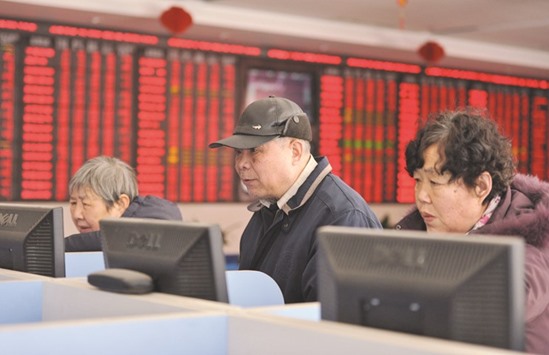News that China’s economy grew last year in line with expectations lifted Asian stocks yesterday, providing some rare support at the start of a turbulent year that has seen global markets hammered.
However, while most bourses across the region enjoyed a strong rally led by Shanghai, dealers remain cautious as the China figure still marked the worst annual growth performance in a quarter of a century.
Beijing said gross domestic product expanded 6.9%, in line with the government’s target of “about 7%” and matching a forecast in an AFP survey.
However, it was much weaker than the previous year and highlights the task facing the country’s leadership as it struggles to recalibrate the growth engine.
The sharp slowdown in China has sent shockwaves through stock markets from Asia to the Americas over the past six months, in a rout that has wiped trillions off valuations and fuelled fears of another global economic crisis.
Shanghai’s stock market, which has plunged almost 20% since the start of this year, ended up 3.2% in characteristically volatile trade. Analysts said the gains were boosted by expectations of government stimulus measures to kickstart growth this year.
Others said the government-backed “national team” investment group was buying shares to prevent a market sell-off, with one eye on the upcoming Chinese New Year break.
“The sharp rise today is, without a doubt, supported by the ‘national team’ as this is a good window for them to swoop in,” Phillip Securities analyst Chen Xingyu told AFP. “Only they have the resources to lift the market this fast.”
Other markets also turned higher after sinking in the morning.
Hong Kong added 2.1% while Tokyo gained 0.6% by the close and Sydney added 0.9%.
Australia’s dollar was up 0.8% against the greenback, the South Korean won added 0.4% and the Malaysian ringgit gained 0.7%.
“The market was pricing in much worse,” said Nader Naeimi, Sydney-based head of dynamic markets at AMP Capital Investors.
“The markets had intense fears over China... it shows that China isn’t broken.”
Beijing is trying to transform the growth model from investment and exports to one driven by domestic consumer demand.
But while officials said the transformation is under way Jackson Wong, associate director at Huarong International Securities in Hong Kong, said they would struggle to kickstart growth in the coming years.
“I would love to see how they are going to stimulate the economy now. As of now we’ve seen most of the things that they could have done – infrastructure, (lowering bank reserve requirements) and interest-rate cuts and even depreciating the yuan. But we haven’t seen anything to make the economy significantly pick up.” The AFP survey of analysts showed they expect growth to slow to 6.7% this year.
Investors also remain on edge over the turmoil on oil markets, a day after Brent slumped below $28 to its lowest point since late 2003.
The contract edged up yesterday but analysts warned of further downward pressure after Iran ordered the production of half a million extra barrels a day, soon after Western sanctions were lifted.
The move will add to an already flooded market at a time when demand is weak and the global economy is teetering.
“We’ve got Iran knocking on the door with a further 500,000 barrels a day and we think they’ll easily meet that target,” David Lennox, an analyst at Fat Prophets in Sydney, told Bloomberg News.
“Nothing has really changed for the market, investors are still looking for producers to cut supply.”
Brent rose 3% yesterday and US benchmark West Texas Intermediate was 0.9% higher.

Investors look at computer screens showing stock information at a brokerage house in Fuyang, Anhui province. China’s stocks rebounded 3.2% yesterday.
